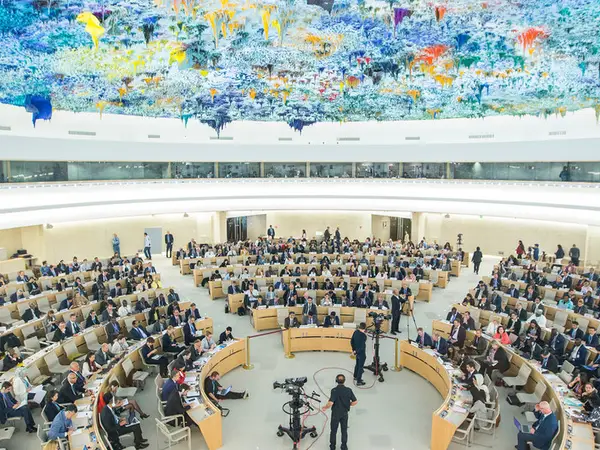Iran said Thursday that Canada must "stop systematic policy on killing indigenous people" after the UN passed a Canadian-sponsored resolution censuring Iran for serious rights abuses.
Saeed Khatibzadeh, the foreign ministry spokesman, said Thursday that the resolution by the General Assembly's Third Committee was "based on weak and scattered international votes" and alleged that many countries voting in favor had been subject to "various political pressures and threats".
The spokesman called on Canada to accept responsibility for its complicity in Israeli “crimes against humanity against the Palestinian people.”
Iran often responds to allegations of human rights abuse by claiming the double standards of the accuser. When asked in June about his role in the 1988 prison executions in Iran, President Ebrahim Raisi (Raeesi) accused the Mujahideen-e Khalq of violence, the opposition group whose members made up the bulk of those executed in 1988.
Human Rights Watch recently said the Canadian government, which refuses to accept the International Criminal Court considering alleged Israel crimes in occupied territory, supported “draconian military rule over Palestinians in the occupied West Bank.”
The resolution by UN Thrid Committee on Iran expressed concern at the “alarmingly high frequency" of the imposition and carrying-out of the death penalty, including executions based on forced confessions or for crimes that do not qualify as the most serious crimes, were overly broad or vaguely defined. It passed at the UN General Assembly committee Wednesday 79-32, with 64 abstentions. The Iranian representative successfully requested a recorded vote.
The General Assembly allocates to its Social, Humanitarian and Cultural Affairs Committee, commonly referred to as the "Third Committee", agenda items relating to a range of social, humanitarian affairs and human rights issues that affect people all over the world.
The MEK immediately called for “the clerical regime, including [Supreme Leader] Ali Khamenei, Ebrahim Raisi, and Gholam-Hossain Mohseni Ejeii [the judiciary chief],” to be “prosecuted by international tribunals.”
Torture and cruel treatment
The resolution expressed serious concern at the imposition of the death penalty against those under 18 at the time of the offence. "Torture or other cruel, inhuman or degrading treatment or punishment," which the resolution said could include sexual violence, were also highlighted.
The resolution called for the release of anyone detained for exercising human rights and fundamental freedoms, including anyone detained solely over peaceful protests, including any in November 2019 and January 2020.
Iran was urged to "end reprisals against human rights defenders, peaceful protesters and their families, journalists and media workers covering the protests, and individuals who cooperate or attempt to cooperate with the United Nations human rights mechanisms."
Truth and reconciliation
Zahra Ershadi, Iran's ambassador and deputy permanent representative to the United Nations, in a statement read to the UN Third Committee, called the resolution "insincere and indefensible political." She said it “replete with factual errors…and unmasks the deliberate hostile policy of incitement to Iranophobia.”
Ershadi accused Canada of genocide over the 215 bodies of indigenous children unearthed in May at one of Canada’s largest residential schools for native Canadians and in its policies of forced assimilation. She said the wider West has been remained silent.
Canada’s delegate at the UN assembly said Wednesdaythat Canada has established a Truth and Reconciliation Commission. Prime Minister Justin Trudeau said Canadians were "horrified and ashamed" at how Canada had behaved and promised remedial action. A Canadian federal court in September upheld a 2016 ruling ordering the government to compensate indigenous children forced into foster care.
